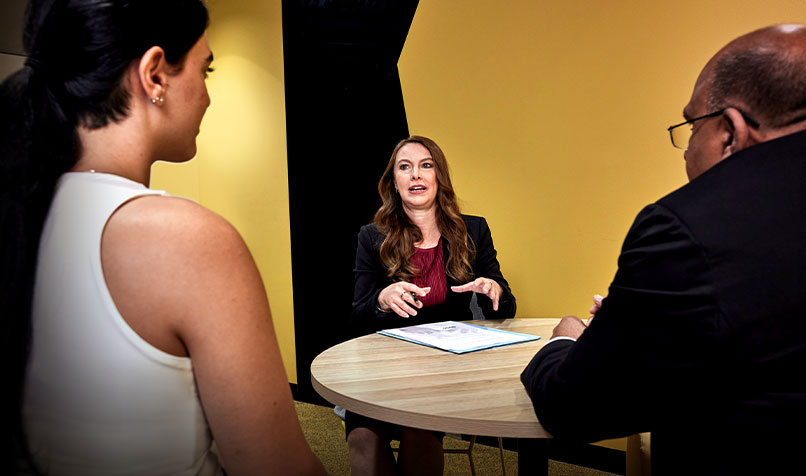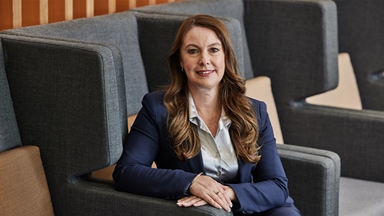Loading component...
At a glance
By Emily Chantiri
Dr Michelle Cull FCPA has had many standout moments in her career, but there is one that really sticks with her.
In 2019, Western Sydney University (WSU) was invited to join the Treasury’s National Tax Clinic pilot program. Cull, who oversaw the university’s accounting and financial planning programs, jumped at the chance to be involved.
Working with WSU’s business school team, Cull developed a plan to implement the clinic, which was provided to Treasury. Within a few months, they had the pilot tax clinic up and running.
The clinic provided free advice to low-income and vulnerable taxpayers, as well as guidance and help with tax matters, such as debt management, tax lodgement and other dealings with the Australian Taxation Office.
“The clinic had to be trialled really quickly, so we could review after a year and decide whether it was an initiative we would continue,” Cull says.
“The success came down to the hard work of the tax clinic manager, who was appointed to the role based on her experience and teaching expertise, having maintained her tax agent status while working as an accounting lecturer.
She did an outstanding job training staff and students who together have provided tax assistance to hundreds of vulnerable taxpayers in our community.”
The clinic, one of 10 set up in universities around the country, was so successful that the program has now been extended to other universities.
Unrepresented taxpayers can feel supported there, working with a team of accounting students who are supervised by appropriately qualified university staff, Cull says.
“When clients come in, they are relieved to be able to sort out their tax. It is very emotional, as most are on a low income. Importantly, our students have an opportunity to work within real-life experiences and real people – both with their tax and the emotions that come with it. Most of the students want to come back and volunteer.”
CPA Australia Learning Insights 2024
Giving back
Before she joined the world of academia, Cull spent 15 years in various accounting and finance roles at ASX 100-listed companies. She became a part-time lecturer in the 1990s, primarily to give back to the profession and use her experience for the benefit of accounting students.
“I had real-life experience in the corporate world. I wanted to impart this to students. My idea was to bring these real-life examples into the classroom, because I felt this would help them when they graduated.
“The more I taught, the more I loved it,” she says.
Valuing the flexibility of her role because of her young family, Cull began teaching management accounting full-time in 2005. She has never looked back.
“I am very comfortable talking with industry. I can bring some of the issues into the university and have our students help with solutions to the problems.”
Financial planning evolution

Cull has a keen interest in financial planning and advisory and holds a PhD in trust and personal financial planning. She has published a range of academic papers and contributed to industry publications and textbooks in the areas of ethics, financial literacy and financial planning education.
With 20 years of financial advisory research and study behind her, she believes the industry is finally heading into the right direction after years of reform. However, there is undeniably more work ahead to improve the financial services culture.
She says there is a disconnect between how financial services are portrayed in the media, where the focus is strongly on the negative, and the real-world experiences of many financial advice clients, which are very positive.
Cull says she had hoped the industry would come together and take steps towards reform and improvement, instead of the changes being imposed externally.
“It was disappointing that the government had to step in and legislate a code of ethics.
We will get there eventually. The bar has been lifted,” she says.
Cull’s recent research looks into the motivation behind becoming a financial adviser, and she says high on the list is the desire to help others.
“What came out strongly at the top was they wanted to help people – this was number one by far. That is the message that needs to come out also, to attract the next generation of financial planners.”
CPA Australia’s Women in Leadership (Finance) virtual classroom series
The new generation
Cull draws energy and motivation from the annual influx of new university students who want to study accounting.
To encourage students to consider studying accounting, Cull contributed to the development of WSU’s bachelor of accounting degree, offered alongside the existing bachelor of business (accounting).
“What makes this bachelor of accounting so special is that it is the only degree in Australia where the students have an accredited accounting degree and financial planning degree," Cull says.
The degree was one of the first to be accredited with the Financial Adviser Standards and Ethics Authority (FASEA) and remains an accredited financial planning program with Treasury.
“It was hard work by a great team,” Cull says.
In addition to standard accounting subjects, the new degree spans financial planning, advanced tax, superannuation, financial services, retirement and succession planning.
Cull’s enthusiasm for the course is evident.
“What is great about this is students who haven’t thought about financial planning, when they leave, they then pick those subjects up and study a major or a double major. This means they have choices and are not limited when they graduate. This is helpful when they enter the workforce.”
Seeing her students take the lessons from the course and apply them in real-world settings is one of the rewards of Cull’s job. This is particularly true when it comes to the students’ own financial future.
“I would almost be in tears, because I was so happy to see what the students learned for themselves, not just to take away for their future employment.
“It is what I value the most – when students study retirement planning and its complexities, and then realise they need to set themselves up early. It is great to see them engage in their finances.”
More recently, Cull has developed a new micro-credential on the basics of personal finance, and she hopes that this will help more Australians to better manage their personal finances.
"The content was co-designed with the community to ensure it directly addresses their needs. It is currently free to enrol, and participants receive a digital badge when they successfully complete the short course,” she explains.
As someone who has experience in both the corporate world and in academia, Cull has this advice to offer.
“In everything I have done through work and at university, my accounting degree has served me well. I really do feel this has set me up for anything I do in life. That is a message I want others who study accounting to understand.”
WalletSmart App
Dr Michelle Cull FCPA’s desire to help more students to manage their finances provided the impetus for Cull and her team to develop the WalletSmart app.
“I found that some students did not understand how some finance basics worked. I thought, ‘Wouldn’t it be great if there was an app where they can go and learn from a trusted source?’. There is so much on the internet that is not correct,” she explains.
The WalletSmart app has no bank branding and covers topics such as savings, compound interest, superannuation and student fees. It offers tips for sharing expenses, buying a car and choosing insurance cover.

